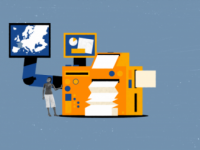While EQAR-registered QAAs publish reports and decisions on their own websites (as stipulated by the ESG), users had difficulties finding and accessing such information, especially from other countries. Using DEQAR you can:
Essential info
DEQAR is the Database of External Quality Assurance Results on activities performed by EQAR-registered quality assurance agencies. DEQAR not only collects their reports and decisions but also helps to understand reports in their context by describing the national QA frameworks of the European Higher Education Area countries.
Below you will find an overview of the whys and wherefores of DEQAR. Also check out:
- DEQAR Glossary (a list of often used, special or technical terms/words and their definitions)
- DEQAR icons and their meaning
- DEQAR FAQ (Frequently Asked Questions – at the bottom of this page)

How
DEQAR was designed to meet various' users needs and to search and access data in different ways. It allows you to:

When
DEQAR was launched in 2018, coinciding with EQAR’s 10th anniversary event at the Paris 2018 EHEA Ministerial Conference.
HEIs and programmes in DEQAR
- DEQAR includes higher education institutions that were externally quality assured in line with the ESG, by an EQAR-registered agency. This might be at institutional or programme level.
- DEQAR only covers external quality assurance procedures within the scope of the ESG, that is, procedures related to teaching and learning in higher education, including the learning environment and relevant links to research and innovation.
The participation of quality assurance agencies in DEQAR
- Participation in DEQAR is voluntary for EQAR-registered agencies. You will therefore only find institutions that were quality-assured by agencies that have decided to participate in DEQAR.
- You can recognise those EQAR-registered agencies that publish their QA results on DEQAR by the orange buttons next to their entry on the list of registered agencies, e.g. View 4711 reports on 11 institutions.
The ESG are the Standards and Guidelines for Quality Assurance in the European Higher Education Area (EHEA). As part of the Bologna Process, European ministers responsible for higher education adopted the ESG as a common framework for quality assurance.
EQAR (European Quality Assurance Register for Higher Education) is the official register of quality assurance agencies operating in substantial compliance with the ESG.
DEQAR is the Database of External Quality Assurance Results produced by EQAR-registered quality assurance agencies.
Please refer to the DEQAR project page and the DEQAR CONNECT project page for background information.
If an institution appears in DEQAR it signifies that one or several external QA procedure(s) of that institution was/were carried out by an agency that demonstrably complies with the ESG. DEQAR provides information on the results of those QA procedures (QA Result).
While this signifies that external quality assurance was in line with European standards, the formal status or value of the QA procedure and result may differ from country to country. Please take into account the information under “National External Quality Assurance Requirements” and on the linked country page.
While the full details of a QA Result can always be found in the full report and decision (these are available for download), the participating agencies describe the general characteristics using a fixed profile. The ESG allow considerable variation in actual QA systems and practices, and agencies apply a “best fit” approach when describing their work.
- “Part of the obligatory EQA system” means that the QA Result carries an official status by law or statute in the higher education system where the institution is based. For example, the results of an obligatory accreditation or evaluation will have this status.
- Any other QA Results are marked as “voluntary”. While these QA Results do not have an official status, they were nevertheless carried out in compliance with European standards. For example, institutions might hold an accreditation by a European subject-specific label, which is in addition to the required national accreditation.
This element describes the general finding of the QA procedure, which is described in detail in the report. Within the framework of the ESG (see Part 1 and standard 2.1) quality assurance agencies set their own standards, which they apply in their external QA procedures. The decision has to be read in relation to those standards.
- “Positive” means that there was a conclusion that the standards set by the agency have been met, e.g. accreditation was granted or a positive audit certificate awarded.
- “Positive with conditions or restrictions” means that the agency imposed some conditions or other formal restrictions or qualifications. Conditions usually have to be fulfilled by the institution/programme concerned before it can be considered as meeting the standards.
- “Negative” means that the applicable standards were not met, e.g. accreditation was denied.
- “Not applicable” means that the QA Result does not include formal decision or conclusion as to the fulfilment of standards. This can be the case for an improvement-oriented evaluation.
This element includes the date when the decision was taken, or the report was finalised and published by the agency.
It further describes how long the result/decision is considered valid, e.g. the duration of accreditation or the validity of the audit certificate.
QA Results may not have a defined validity (e.g. an evaluation that does not lead to a decision and is not part of a national system of cyclical evaluations). If that is the case, the QA Result is displayed as valid for a period of 6 years.
When viewing an institution, you will see all valid QA Results by default. You can click on the “Include historic reports” button to see expired results in addition.
There can be several reasons why a certain institution or programme cannot be found in DEQAR:
- The institution/programme was externally quality assured by a legitimate and credible agency, but that agency is not registered on EQAR:
Even though part of the EHEA key commitments, registration on EQAR is voluntary for agencies. The agency might have never applied, withdrawn its application or been rejected. Furthermore, quality assurance agencies from outside the EHEA cannot generally be expected to use the ESG and be registered on EQAR. - The institution/programme was externally quality assured by an EQAR-registered agency, but the agency does not (yet) publish its QA Results in DEQAR:
As mentioned above, participation in DEQAR is voluntary. - The institution/programme was not externally quality assured by a legitimate and credible agency:
The reasons could be that the institution/programme was unable to meet the standards, but the reason could also be that no external quality assurance is mandatory in its system.
Consequently, the fact that an institution/programme is not in DEQAR does not necessarily imply a deficit in terms of its quality, credibility or legitimacy.
EQAR and DEQAR primarily relate to the European Higher Education Area (EHEA). Aligning external quality assurance with the ESG is one of the EHEA key commitments made by participating countries.
- If your institution is based in the EHEA, but the agency carrying out your obligatory external quality assurance is not registered in EQAR, we recommend that you discuss with your agency whether it has benchmarked its work against the ESG and considered an application for registration on EQAR.
- If your quality assurance agency is registered on EQAR but does not participate in DEQAR, you may encourage the agency to publish its reports on DEQAR. In order to offer a feasible option for all agencies, DEQAR offers three technical methods in which agencies can participate.
- If your institution is based outside the EHEA, DEQAR might be of relevance if your institution wishes to demonstrate alignment with the European framework for higher education. EQAR registration is open to quality assurance agencies regardless of where they are based, but based on compliance with a European set of standards, the ESG. Furthermore, various EQAR-registered agencies offer external quality assurance also for higher education institutions from outside the EHEA.
Unfortunately, our database was not built to search by programmes, since the objective of the database was not to establish a list or catalogue of all programmes or study opportunities in the EHEA. Given the diverse (national) external QA systems across the EHEA, such a list of programmes would necessarily be incomplete.
Therefore, the database was based on an equal representation of approaches: institutions should be equally represented in the database, no matter if they are accredited/audited at institutional level or have their different programmes accredited; all types of reports must be covered (also if there is no decision, for instance).
In cases where there is no external quality assurance at programme level (e.g. institutional audits only), information on individual programmes could not be offered via the database as such information is normally not collected by registered agencies. Users can nonetheless refer to the website of the higher education institution to inform themselves about the specific programmes offered by the higher education institution in question.
The starting point for the database is thus the institution, so as to represent higher education institutions in a comparable and fair way.
- Basic information on higher education institutions (name, location, etc.) and on national external quality assurance systems: please contact EQAR
- Information on QA result: please contact the responsible registered quality assurance agency. As a rule, EQAR does not change this information itself, as it is in the responsibility of the agency.
DEQAR has been created for the public good and the information contained in it is public by nature. The information is freely accessible for anybody free of charge.
The Metadata may be used freely under the Open Data Commons Public Domain Dedication and Licence (PDDL). Please respect the Open Data Commons Community Norms.
The Original Documents (i.e. report, decision and other files) are the property of the responsible agency. They are available subject to the terms stipulated either in the document itself or on the agency’s website. Should no other terms be specified, they can be used under the conditions of the Creative Commons Attribution Share-Alike 4.0 (CC-BY-SA-4.0) license.
Please refer to the DEQAR Terms and Conditions for details.
The Web API is a REST API allowing you to embed search and browse of the information in DEQAR into your own applications. To get started, the Connect to API page provides an overview and links to detailed documentation of all endpoints (OpenAPI Specification 3.0).
To ensure that the information is not used in a way that jeopardises the objectives of DEQAR and to avoid excessive resource consumption, EQAR limits access to registered users. Access is free of charge, but EQAR reserves the right publish a list of registered users for transparency reasons.
We will grant access to any individual or organisation unless we have reason to believe that the information might be abused, misrepresented or used in violation of the Terms and Conditions. To obtain login details, please send us an email at info@eqar.eu and briefly indicate how you plan to use DEQAR data.


